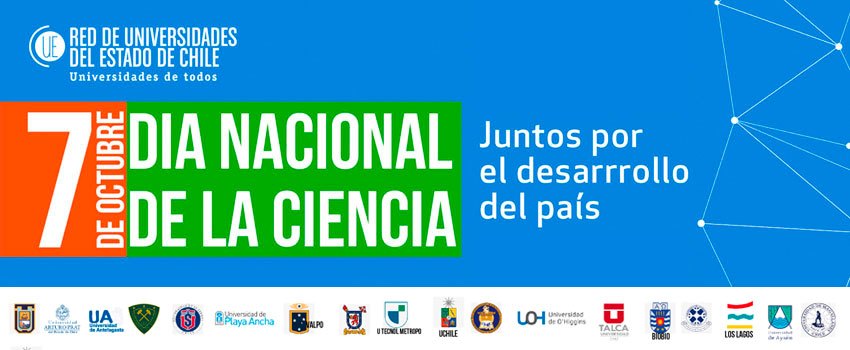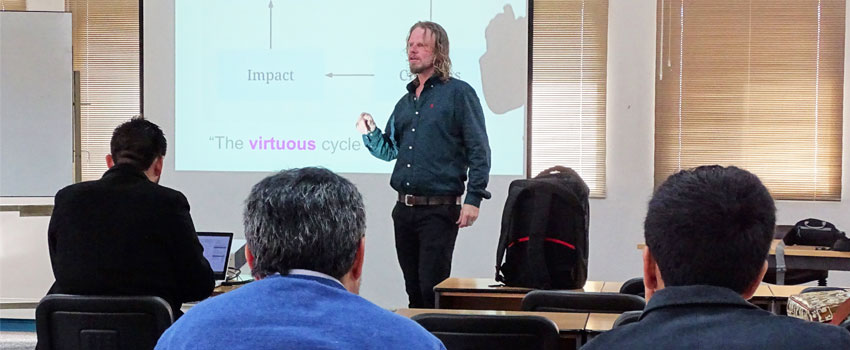
The activity was organized by the Research and Development Directorate together with the Integrated Management of Pedagogies Unit (UGIP) -PMI FIP ULS1501- within the framework of the policy to encourage the publication of scientific articles.
The workshop titled “Scientific Writing and Publication in Indexed Journals: Key Tools for Success” was held with the purpose of promoting scientific publication at the University of La Serena in the area of education. The event was directed by expert Ian Scott Kinney, scientific editor and creator of the Journal Revisions support space for researchers.
“It is not enough to write a good paper, because writing is a small percentage and is not the key to success, but rather how I can publish it by recognizing that this is a cyclical process (…). The idea is to be able to leave the participants with installed capabilities so they can be successful again with their publications,” said the expert.
On occasion, he explained that the elements that make up the “virtuous cycle” are related to the visibility of the article, the citations, the impact and the relevance that it obtains.
“The citation patterns show me the impact that the information produced at the moment is having. In simple terms, this means that receiving numerous citations of information that is invisible does not give me even a fraction of the size, unlike if I am cited by large sources of information. Secondly, it is important to recognize coherence, if I want to be cited by the greats, I must also cite sources that have visibility in the medium and thus mine will be much greater. Receiving a citation from a good journal means that, in the search results, my article has as much visibility as that journal,” said Ian.
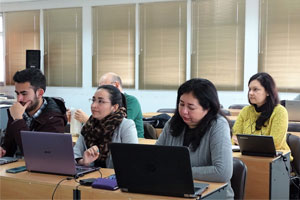 He also emphasized that, in the analysis they carry out on the works to obtain greater possibilities of publication, they take into account the title, the keywords and the combination that these have in the article.
He also emphasized that, in the analysis they carry out on the works to obtain greater possibilities of publication, they take into account the title, the keywords and the combination that these have in the article.
“The title is the set of keywords of the article, these will be the guide for how I design my text (…). Keywords with greater or lesser appearances in search engines will help us predict the possible impact of what I want to write, and if we can identify those trends or moments of emergencies, we will be able to better focus the lines of research to publish. This way we will avoid writing about topics that are already saturated,” said the speaker.
Academics from ULS pedagogy courses who are starting out in this field and who are interested in publishing their research work in scientific publications participated in the activity. For this reason, the professional announced that the University of La Serena, through the Research and Development Directorate, currently has an agreement with Journal Revisions, which allows advising the institution's researchers on the publication of their scientific articles. .
“We have consultancy quotas as part of this alliance, therefore, you can send us your work and we will review it at no cost. We identify weak points, do impact analysis and see feasibility of publication in scientific journals; Corrections are sent and then work is done on the final product,” the expert explained.
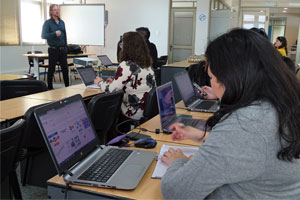 Finally, the professional presented some suggestions to consider when writing a research paper, among which are starting with global relevance, reducing everything to a group of keywords, choosing the sample size and methodology according to the current literature, demonstrate a concise, orderly and relevant theoretical base, clearly state what contribution the study seeks to make, make small innovations within the niche, identify which is the best journal to publish, among others.
Finally, the professional presented some suggestions to consider when writing a research paper, among which are starting with global relevance, reducing everything to a group of keywords, choosing the sample size and methodology according to the current literature, demonstrate a concise, orderly and relevant theoretical base, clearly state what contribution the study seeks to make, make small innovations within the niche, identify which is the best journal to publish, among others.
It should be remembered that the workshop is part of the actions focused on the Institutional Improvement Plan for Pedagogies, which through the “Applied Pedagogical Research” subunit, seeks to enhance and increase scientific production in the area of education. within the academic body of the institution.
Source: Unit for the Integrated Management of Pedagogies (UGIP) | PMI FIP ULS1501 – CM ULS 1755

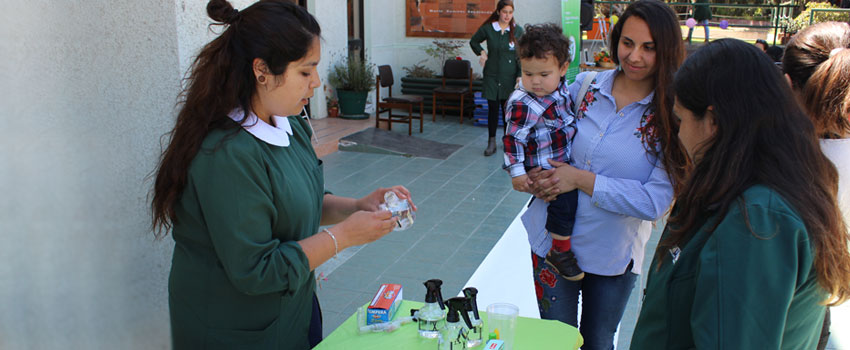
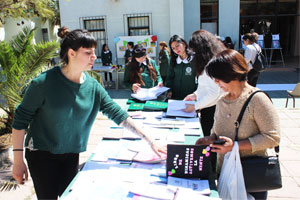 The academic from the Department of Education, Dr. Rossana Godoy, pointed out that the purpose of this initiative is “to deepen the spaces for reflection and appreciation of what childhood is. The work, studies, didactics and resources that are shared (in the sample) aim to raise awareness in the community regarding our role, our commitment and how we are advancing in raising awareness as citizens in this commitment to the value of children's rights, with the value of the relationships we forge at this stage of their lives, with the value of looking at ourselves with an understanding of how we are doing and how we are addressing these relations".
The academic from the Department of Education, Dr. Rossana Godoy, pointed out that the purpose of this initiative is “to deepen the spaces for reflection and appreciation of what childhood is. The work, studies, didactics and resources that are shared (in the sample) aim to raise awareness in the community regarding our role, our commitment and how we are advancing in raising awareness as citizens in this commitment to the value of children's rights, with the value of the relationships we forge at this stage of their lives, with the value of looking at ourselves with an understanding of how we are doing and how we are addressing these relations". 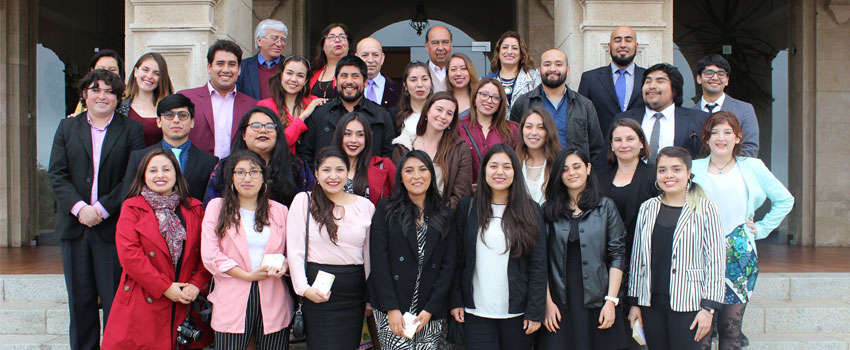
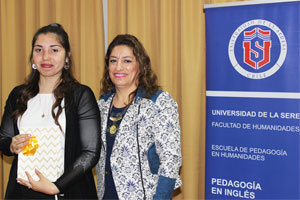 This year, the recognition for the best graduate was obtained by Fernando Castro, who pointed out that “receiving this recognition is very significant and demonstrates the effort I put into the years of my degree.” In turn, the distinction for the spirit of the race remained in the hands of Macarena Carvajal.
This year, the recognition for the best graduate was obtained by Fernando Castro, who pointed out that “receiving this recognition is very significant and demonstrates the effort I put into the years of my degree.” In turn, the distinction for the spirit of the race remained in the hands of Macarena Carvajal.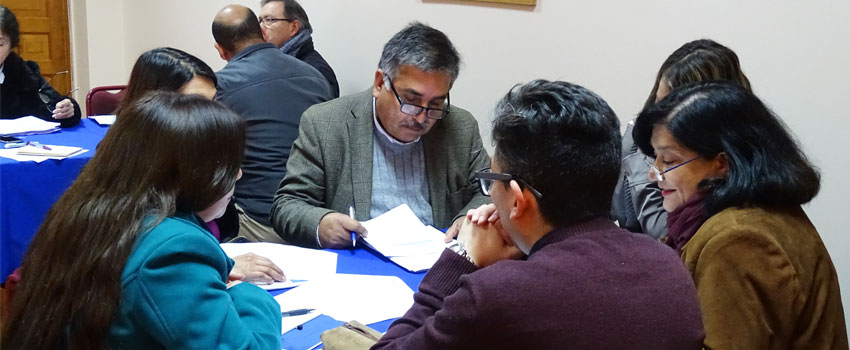
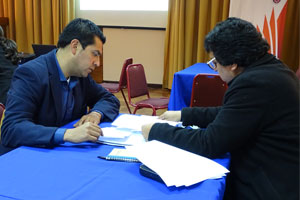 “The role that the UGIP has will be fundamental in the task of implementing the necessary improvements in the pedagogy courses of the University through the respective remedial plans, since it is the institutional unit that works so that the pedagogies are integrated and work in an coordinated,” explained on the occasion the alternate executive director of the PMI, Dr. Fabián Araya.
“The role that the UGIP has will be fundamental in the task of implementing the necessary improvements in the pedagogy courses of the University through the respective remedial plans, since it is the institutional unit that works so that the pedagogies are integrated and work in an coordinated,” explained on the occasion the alternate executive director of the PMI, Dr. Fabián Araya.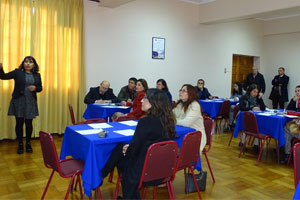 “We can say that students, according to their knowledge and identification of information, handle it very well, that is, they can know information and identify it effectively. The weakness is in the inference, in the interpretation of the information and that is where we have to start making decisions, reviewing whether our programs respond to the development of higher skills, that is, if they are focused on differential elements (...); and the second is that starting in 2016 the Quality Agency is stipulating work with the channels of informative and progressive evaluation, and that represents a fundamental change in perception from an evaluation of learning to an evaluation for learning, and “That represents a greater challenge for us,” said the Mg. Rodrigo Vega.
“We can say that students, according to their knowledge and identification of information, handle it very well, that is, they can know information and identify it effectively. The weakness is in the inference, in the interpretation of the information and that is where we have to start making decisions, reviewing whether our programs respond to the development of higher skills, that is, if they are focused on differential elements (...); and the second is that starting in 2016 the Quality Agency is stipulating work with the channels of informative and progressive evaluation, and that represents a fundamental change in perception from an evaluation of learning to an evaluation for learning, and “That represents a greater challenge for us,” said the Mg. Rodrigo Vega.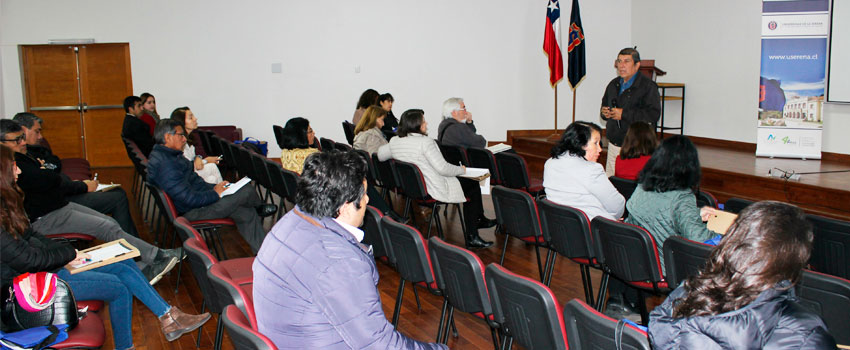
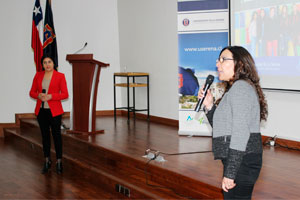 In his welcoming words, the Rector(s) of the ULS, Dr. Jorge Catalán, thanked the representatives of the educational establishments for their presence and pointed out that “this instance is developed as a contribution to those who have the task of accompanying the young people is their previous step to Higher Education.”
In his welcoming words, the Rector(s) of the ULS, Dr. Jorge Catalán, thanked the representatives of the educational establishments for their presence and pointed out that “this instance is developed as a contribution to those who have the task of accompanying the young people is their previous step to Higher Education.”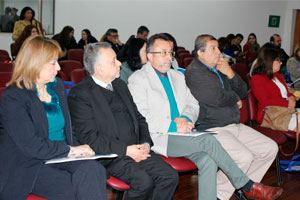 While the counselor of the Providencia School, Doris Rojas, highlighted that the University of La Serena organizes these meetings year after year for the establishments in the region “to be able to update ourselves regarding certain topics, such as the benefits and opportunities that the institution offers to Young".
While the counselor of the Providencia School, Doris Rojas, highlighted that the University of La Serena organizes these meetings year after year for the establishments in the region “to be able to update ourselves regarding certain topics, such as the benefits and opportunities that the institution offers to Young".